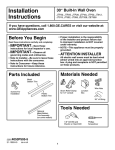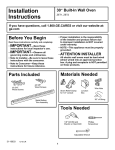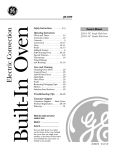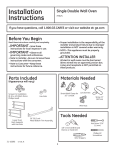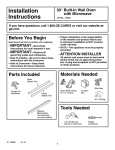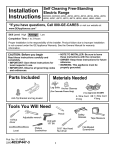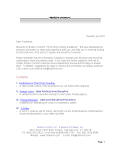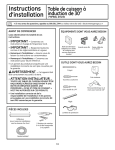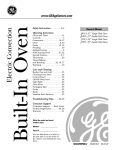Download GE JTP20 User's Manual
Transcript
Installation Instructions 30” Built-In Wall Oven JTP20, JTP25, JTP28, JTP48, JTP50, JT912, JT915, JT952, JT955, ZET938, ZET958 If you have questions, call 1.800.GE.CARES or visit our website at: ge.com Before You Begin • Proper installation is the responsibility of the installer and product failure due to improper installation is NOT covered under warranty. • NOTE—This appliance must be properly grounded. Read these instructions carefully and completely. • IMPORTANT—Save these instructions for local inspector’s use. • IMPORTANT—Observe all • governing codes and ordinances. • Note to Installer—Be sure to leave these instructions with the consumer. • Note to Consumer—Keep these instructions for future reference. ATTENTION INSTALLER All electric wall ovens must be hard wired (direct wired) into an approved junction box. A plug and receptacle is NOT permitted on these products. Materials Needed Parts Included Metal Bottom Trim Wire Nuts Screws For Installation Strain Relief Clamp for 1/2” conduit Plastic Bottom Trim Junction Box 36” of String Tools Needed Optional Metal Bottom Trim Assembly (on some models) 1/8” Drill Bit and Electric or Hand Drill 31-10659 1-07 JR 1 Phillips Screwdriver Installation Instructions IMPORTANT SAFETY INSTRUCTIONS For Your Safety Electrical Requirements • Be sure your oven is installed properly by a qualified installer or service technician. • Be sure the oven is securely installed in a cabinet that is firmly attached to the house structure. Weight on the oven door could cause the oven to tip and result in injury. Never allow anyone to climb, sit, stand or hang on the oven door. • Make sure the cabinets and wall coverings around the oven can withstand the temperatures (up to 200°F) generated by the oven. We recommend you have the electrical wiring and hookup of your oven connected by a qualified electrician. After installation, have the electrician show you where your main oven disconnect is located. Check with your local utilities for electrical codes which apply in your area. Failure to wire your oven according to governing codes could result in a hazardous condition. If there are no local codes, your oven must be wired and fused to meet the requirements of the National Electrical Code, ANSI/NFPA No. 70–Latest Edition. You can get a copy by writing: National Fire Protection Association Batterymarch Park Quincy, MA 02269 Effective January 1, 1996, the National Electrical Code requires that new, but not existing, construction utilize a four-conductor connection to an electric oven. When installing an electric oven in new construction, a mobile home, recreational vehicle or an area where local codes prohibit grounding through the neutral conductor, follow the instructions in the section on NEW CONSTRUCTION AND FOUR-CONDUCTOR BRANCH CIRCUIT CONNECTION. You must use a three-wire, single-phase A.C. 208Y/120 Volt or 240/120 Volt, 60 hertz electrical system. If you connect to aluminum wiring, properly installed connectors approved for use with aluminum wiring must be used. WARNING: The electrical power to the oven supply line must be shut off while line connections are being made. Failure to do so could result in serious injury or death. Electrical Requirements This appliance must be supplied with the proper voltage and frequency, and connected to an individual, properly grounded branch circuit, protected by a circuit breaker or fuse having amperage as noted on rating plate. (Rating plate is located on oven frame.) Rating Plate Location (behind oven door) 2 Installation Instructions Pre-Installation Checklist ALL INSTALLATION INFORMATION ON THE FOLLOWING PAGES IS TO BE USED FOR SINGLE AND DOUBLE OVEN INSTALLATION! Door removal is not a requirement for installation of the product, but is an added convenience. To remove the door: Open the oven door as far as it will go. Remove packaging materials. Check behind hinges and under false bottom. Remove labels on the outside of the door, plastic on trims and panel, all tape around the oven, and any shipping screws securing the oven to the base pad. Push both hinge locks down toward Hinge the door frame, Hinge Slot Slot to the unlocked position. This may require a flat blade screwdriver. Hinge Hinge Unlocked Unlocked Position Position Hinge Hinge Arm Arm DO NOT LIFT THE DOOR BY THE HANDLE! Place hands on both sides of the door, and close the oven door to the removal position. This is half way between the broil stop and fully closed. Oven Racks EASY INSTA LLA TIO EASY INSTALLATION OFNYOUR NEW Before 30" IMPOR you begin WALL OF YO 30" -Read WALL OVEN IMPOR TANTOVEN UR NE Save these Note TANTinstru OBSE these W to Broiler Pan and Grid instru Install ctions OWNE RVE instructions you begin-Read completely and carefully. Before er- Bethese comp ALL ctions Note- R- Keep for inspector’s GOVE these sure instructions for local IMPORTANTletelyuse. ThisSave these to leave RNINGlocal inspec and applia IMPORTANT- OBSERVE ALL GOVERNING CODES AND ORDIANCES. instru carefu CODE these nce tor’s ctions Note to Installer- Be suremust to leave these with the consumer. S AND instru use. lly. for instructions be ctions future ORDIA OWNER- Keep these instructionsprope for future reference. with rly grounrefere FOR the NCES. Note- This appliance must be properly grounded (if applicable). nce. YOUR consu ded SAFE (if applic mer. Before TY able). instru you begin carefu ctions comp-Read lly. YOUR SAFETY ELECTRICAL REQUIREMENTS IMPORFOR letely these and ELEC instru TANTTRICA ctionsyouSave Before begin-Read IMPOR Before you begin-Read these these L REQU these Before TANT for local completely and GOVEinstructions IREME instructions completely and RNING - OBSE inspec instru you begin NTS Note carefully. tor’s carefully. RVE to Install CODE Save carefu ctions comp-Read use. ALL these these IMPORTANTIMPORTANT- Save these er- Be S AND IMPOR lly. letely these instructions localORDIA inspector’s use. OWNE instru instructions for localand inspector’s use. sure ctions for instru TANTNCES Rto leave IMPORTANTOBSERVE ALL for future Keep with Save OBSERVE ALL IMPORTANTctions . the these CODES these NoteGOVERNING AND ORDIANCES. IMPORGOVERNING for localCODES refere AND ORDIANCES. instru consu GOVE TANTctions prope ThisNote inspec tonce. Installer- Be sure mer. to leave applia OBSE RNING Note to InstallerBe sure to leave rly groun nce Note tor’s RVE these instructions with the consumer. Before to these CODE instructionsALL with theuse. consumer. ded must be these Install S AND instru youOWNERKeep these instructions er- Be begin (if applic OWNERKeep these instructions OWNE instru ctions sure ORDIANCES -Read able). carefu ctionsfor future reference. R- Keep to leave for futurewith reference. comp for future these . IMPOR lly. Note- This letelyappliance must be the Note-these This appliance must be Noterefere and instru consumer. instru TANT-properly grounded (if applicable). This nce. properly grounded (if applicable). Save ctions prope applia IMPORctions for Beforethese you begin-Read these nceyou begin-Read these Before Beforerly groun local GOVE TANT- instructions ded mustcompletely OBSE inspeccompletely and instructions and instru you begin (if applicbe Note RNING carefully. CODE RVE ALL tor’s use. -Read carefully. to carefu ctions comp able). these Install S AND Save these er-IMPORTANTIMPOR lly. letely these IMPORTANTSave these OWNE instructionsBe sure ORDIA and instructions for local inspector’sinstru use. TANT instructions for local inspector’s use. NCES R- Keep to leave for future with . ALL IMPORctions - Save IMPORTANTOBSERVE the these IMPORTANTOBSERVE ALL these for local Noterefere instru consu GOVERNING CODES AND ORDIANCES. GOVE TANTGOVERNING inspec CODES AND ORDIANCES. ctions mer. prope This appliance. OBSE Note RNING rly groun nceNote to Installer- Be sure to leave tor’s Be sure to leave RVE Note to InstallerCODE to use. ALL mustinstructions with the consumer. these Install ded these S AND instructions with the consumer. er- these (if applicbe OWNE instructionsBeOWNEROWNER- Keep these instructions sure ORDIA Keep these instructions able). R- Keep to leave NCES for future with for future reference. reference. . the thesefor future Noteconsu refere Note- This appliance must be instruThis Noteappliance must be ctions mer. prope This appliance. properly grounded (if applicable). rly groun nce properly grounded (if applicable). must ded (if applicbe able). Literature Pack Lift door up and out until the hinge arms clear the slots. Open oven door and remove literature pack, broiler pan and grid, and oven racks. Remove Installation Instructions from literature pack and read them carefully before you begin. Be sure to place all literature, Owner’s Manual, Installations, etc. in a safe place for future reference. Hinge Clears Slot NOTE: The oven door is very heavy. Be sure you have a firm grip before lifting the oven door off the hinges. Use caution once the door is removed. Do not lay the door on its handle. This could cause dents or scratches. 3 (Continued on following page) Installation Instructions Pre-Installation Checklist cont. Place the oven on a table or platform even with the cutout opening. (Platform must support 150 lbs. single, 275 lbs. double.) Remove the bottom trim from the top of the oven. It will be installed at the end of the installation process. The trim is wrapped separately and taped to the top of the unit. 4 Installation Instructions A1 Cutout for Single Built-In Oven Cutout CUTOUT Width WIDTH 28 Min. 28 1/2” 1/2" MIN. 28 5/8”MAX. Max. 28 5/8" 5” 5" JUNCTION BOX Junction Box LOCATION Location ALLOW 11/16" FOR OVERLAP OF THE Allow 11/16” for OVEN OVER SIDE overlap of oven EDGES OF CUTOUT over side edges of cutout Opening Between THE OPENING Inside INSIDE Walls BETWEEN WALLS MUST Must Be BE LEAST AtAT Least 28 1/2"WIDE 28 1/2” Wide Cutout CUTOUT Height HEIGHT 27 1/4”MIN. Min. 27 1/4" 27 5/16" 27 5/16”MAX. Max. 22" 22”TO to BOTTOM Bottom OF of JUNCTION BOX Cabinet Width 30” Recommended Minimum Cutout Location from Floor 32 1/2” Cutout Depth 23 1/2” Min. Cutout Width 28 1/2” Min. 28 5/8” Max. Cutout Height 27 1/4” Min. 27 5/16” Max. Junction Box 21” 21" ALLOW AllowAaMINIMUM minimum of OF 21" FOR CLEARANCE 21” for clearance TO ADJACENT CORNERS,to adjacent corners, DRAWERS, WALLS ETC. WHEN THE DOORwalls, IS OPENED. drawers, etc. when door is open Allow 1” ALLOW 1" FOR OVERLAP for minimum ON OVENofTOP overlap oven AND BOTTOM top and 11⁄4” OF CUTOUT RECOMMENDED Recommended CUTOUT minimum cutout LOCATION 32 1/2" location from FROM THE floor 32 1/2” FLOOR NOTE: If the cabinet does not have a front frame and the sides are less than 3/4” thick, shim both sides equally to establish the cutout width. overlap of oven bottom of cutout CABINET Cabinet WIDTH Width 30" 30” If the cabinet does not have a solid bottom, two braces or runners must be installed level with the bottom of the cutout to support the weight of the oven. For single ovens, the runners and braces must support 150 lbs. CL 2”x x4"4” 2" or or EQUIVALENT equivalent RUNNERS runners level with bottom of cutout NOTE: If marks, blemishes or the cutout opening are visible above the installed oven, it may be necessary to add wood shims under the runners and front trim until the marks or opening are covered. Suitable Bracing to Support SUITABLE Runners BRACING TO SUPPORT RUNNERS 21 5/8” 21 5/8" OVER CENTERLINE Over Centerline OF CABINET of Cabinet This oven is not approved for stackable or side by side installation. 5 Installation Instructions A2 Cutout for Double Built-In Oven Cutout CUTOUT Width WIDTH 28 Min. 28 1/2” 1/2" MIN. 28 Max. 28 5/8” 5/8" MAX. Junction JUNCTIONBox BOX LOCATION Location ALLOW 11/16" FOR OVERLAP Allow for OF11/16” THE OVEN overlap of oven OVER SIDE EDGES over OF side edges CUTOUT of cutout ALLOW A MINIMUM OF 21" Allow a minimumTO of FOR CLEARANCE 21” for clearance to ADJACENT CORNERS, adjacent corners, DRAWERS, WALLS ETC. drawers, walls, etc. WHEN THE DOOR whenISdoor is open OPENED. Opening Between THE OPENING Inside Walls BETWEEN Must Be INSIDE WALLS MUST At BELeast AT LEAST 28281/2” Wide 1/2"WIDE Allow 1” minimum for overlap of oven ALLOW 1"1FOR 1 top and ⁄” OVERLAP4 overlap of ON OVEN TOP ovenBOTTOM bottom AND OF of CUTOUT cutout Cabinet Width 30” Recommended Minimum Cutout Location from Floor 12” Cutout Depth 23 1/2” Min. Cutout Width 28 1/2” Min. 28 5/8” Max. Cutout Height 51 13/16” Min. 51 15/16” Max. 5” 5" 47”TO to 47" BottomOF of BOTTOM JUNCTION Junction BOX Box Cutout CUTOUT Height HEIGHT 51 13/16” 13/16" MIN. 51 Min. 51 15/16" 51 15/16”MAX. Max. NOTE: If the cabinet does not have a front frame and the sides are less than 3/4” thick, shim both sides equally to establish the cutout width. 21” 21" 30" 30” Cabinet CABINET WIDTH Width Recommended RECOMMENDED CUTOUT LOCATION minimum cutout location 12" FROM from floorTHE 12”FLOOR f the cabinet does not have a solid bottom, two braces or runners must be installed level with the bottom of the cutout to support the weight of the oven. For double ovens, the runners and braces must support 275 lbs. CL 2”x x4"4” 2" or or EQUIVALENT equivalent RUNNERS runners level with bottom of cutout NOTE: If marks, blemishes or the cutout opening are visible above the installed oven, it may be necessary to add wood shims under the runners and front trim until the marks or opening are covered. Suitable Bracing to Support SUITABLE Runners BRACING TO SUPPORT RUNNERS 21 5/8” 21 5/8" OVER OverCENTERLINE Centerline OF CABINET of Cabinet 6 Installation Instructions A3 Cutout for Single Built-In Oven Under Counter Gas or electric cooktops mayGas be or installed over thismay electric cooktops be See installed over this oven. oven. cooktop installation See cooktop instructions forinstallation cutout size. instructions for cutout size. See See label on top of oven for label on top of oven for approved cooktop approved cooktopmodels. models. Gas and electrical connections forGas 30"and gaselectrical cooktop must be for connections located incooktop an adjacent accessible 30” gas must be located in an adjacent accessible location to the right. For location a 36" the right. For 36” gas cooktop, gastocooktop the connections the connections may be made may to the left. to be the made left. 240V / 208V 240V / 208V Junction Box Junction Box Location Location 25” 25" 5” 5" Topand/or and/or side Top side fillers fillers be may be may necessary necessary if if unit is positioned unit is positioned between existing betweenBe existing cabinets. sure cabinets. Be sure they are attached securely, they they aresince attached will anchorsince the oven securely in the will cabinet. they anchor 28 1/2” 1/2"Min. MIN. 28 5/8” 5/8"Max. MAX. Allow 11/16" Allow 1” overlap top of oven and Overlap Top 11/16” overlap of Oven & side edges of Side Edges cutout of Cutout 271/4" 1/4” Min. 27 MIN. 275/16" 5/16” Max. 27 MAX. the oven in the cabinet. 22" MIN. 22” Min. Above Above Support Support Platform Platform 36" 36” Typical Typical Countertop Countertop Height Height 24" 24” 3/4" Support 3/4” Platform Support Platform Required Required 9/16” 55Reference 9/16" dimension for Reference dimension maximum support height with for maximum support height typical 36” countertop height with typical 36" countertop height MUST 150LBS. LBS. MUST SUPPORT SUPPORT 150 NOTE: This oven is not approved to be installed under a solid disk, induction or downdraft modular cooktop. 7 Installation Instructions B Electrical Connections ATTENTION INSTALLER All electric wall ovens must be hard wired (direct wired) into an approved junction box. A plug and receptacle is NOT permitted on these products. DO NOT shorten the flexible conduit. The conduit strain relief clamp must be securely attached to the junction box and the flexible conduit must be securely attached to the clamp. If the flexible conduit will not fit within the clamp, do not install the oven until a clamp of the proper size is obtained. B1 Turn off the circuit breaker or remove fuses to the oven branch circuit. B2 With the oven supported on a table or platform in front of the cabinet opening, connect the flexible conduit to the electrical junction box as shown below. Position the conduit in such a manner that it will lie on top of the oven in a natural loop when the oven is installed. You will need to purchase an appropriate strain relief clamp to complete the connection of the conduit to the junction box. Junction Box Location NOTE TO ELECTRICIAN: The 3 power leads supplied with this appliance are UL recognized for connection to heavier gauge household wiring. The insulation of these 3 leads is rated at temperatures much higher than the temperature rating of household wiring. The current carrying capacity of the conductor is governed by the wire gauge and the temperature rating of the insulation around the wire. 5” Conduit 48 1/2” long GROUND WIRE BARE GROUND RED WHITE BLACK WARNING: Improper Place oven on a support to assist in connecting conduit connection of aluminum house wiring to copper leads can result in an electrical hazard or fire. Use only connectors designed for joining copper to aluminum and follow the manufacturer’s recommended procedure closely. 8 Strain Relief Clamp (not included) must be used at Junction Box (Continued on following page) Installation Instructions B Electrical Connections cont. B3 New Construction and Four-Conductor Branch Circuit Connection B4 Three-Conductor Branch Circuit Connection When connecting to a three-conductor branch circuit, if local codes permit: • When installing in new construction, or a. Connect the bare oven ground conductor with the crimped neutral (white) lead to the branch circuit neutral (white or gray in color), using a wire nut. • When installing in a mobile home, or • When installing in a recreational vehicle, or • When local codes do not permit grounding through neutral: a. Cut the neutral (white) lead from the crimp. Re-strip the neutral (white) lead to expose the proper length of conductor. Ground and Neutral Wires Ground Wire Junction Box Cover b. Connect the oven red lead to the branch circuit red lead in accordance with local codes, using a wire nut. Junction Box Cover c. Connect the oven black lead to the branch circuit black lead in accordance with local codes, using a wire nut. If the residence red, black or white leads are aluminum conductors, see WARNING on page 8. b. Attach the appliance grounding lead (green or bare copper) in accordance with local codes. If the residence grounding conductor is aluminum, see WARNING on page 8. d. Install Junction Box Cover. c. Connect the oven neutral (white) lead to the branch circuit neutral (white or gray) in accordance with local codes, using a wire nut. d. Connect the oven red lead to the branch circuit red lead and the oven black lead to the branch circuit black lead in accordance with local codes, using wire nuts. If the residence red, black or white leads are aluminum conductors, see WARNING on page 8. e. Install Junction Box Cover. 9 Installation Instructions C Securing the Oven in the Opening C1 Sliding the Oven Into the Opening C2 Drilling the Pilot Holes and Mounting the Oven a. Loop (do not tie) a 36” string around the conduit before the oven is slid into place. This will keep the conduit from falling behind the oven. NOTE: Before drilling the pilot holes, make sure the oven is pushed as far back into the opening as it will go and centered. a. Drill through the mounting holes (top and bottom) of the side trim, for the #8 screws provided. Pull out on string loop while pushing the oven into the cabinet Mounting Hole Locations The screws must be a minimum of 1/4” from the front of the cutout. b. Lift oven into cabinet cutout using the oven opening as a grip. Carefully push against oven front frame. Do not push against outside edges. c. As you slide the oven back, pull the string so that the conduit will lie on top of the oven in a natural loop. WARNING: Mounting screws must be used. Failure to do so could result in the oven falling out of the cabinet causing serious injury. d. When you are sure the conduit is out of the way, slide the oven 3/4 way back into the opening. Remove the string by pulling on one end of the loop. b. Secure the oven to cabinet with screws provided. NOTE: If the cabinet is particle board, you must use #8 x 3/4” particle board screws. These may be purchased at any hardware store. 10 (Continued on following page) Installation Instructions To install a single metal bottom trim assembly (on some models), use sections C3 and C4. To install a metal bottom trim with a plastic bottom trim (on some models), use sections C3–C5. C3 Preparing for the Bottom Trim Installation C5 Installing the Plastic Bottom Trim (on some models) a. With oven installed, take the bottom trim and center it on the bottom front edge of the cabinet opening. a. Make sure flat side is up on the plastic bottom trim. b. Using the trim as a template, mark the center of each slot (two total) where the mounting holes will be drilled. b. Find the key slot on the back of the trim. With Lower Trim in Position, Mark (2) Mounting Hole Locations Key Hole Slot and Wide Flange at Top Remove Lower Trim Before Pre-drilling Mounting Holes c. Remove the trim. d. Drill pilot holes into the center of each template mark. c. Match the key slot with the rivet on the bottom of the side trim, and lower the trim onto the rivet. C4 Installing the Metal Bottom Trim a. Place the bottom metal trim centered over the pre-drilled mounting holes. Tape the edges of the trim down to maintain the alignment. Lower Trim Mounting Rivet on End of Metal Lower Trim d. Push the trim down, at both ends, until it snaps securely into place. b. Using two trim screws provided, secure the bottom trim to the bottom edge of the cabinet. If a plastic bottom trim is supplied, proceed to C5. Side Trim Trim Screws Push Trim Down at Both Ends Until it Snaps Securely Into Place Side Trim CAUTION: Be sure you Metal Lower Trim do not tip the oven forward during installation or you may bend the bottom trim. The bottom trim provides an opening for cooling air to enter the cabinet. This opening should never be blocked. IMPORTANT: If this unit is ever removed from the cabinet or the oven is ever pulled out for service, the trim must be removed first or damage to the trim will occur. 11 Installation Instructions D Replacing the Oven Door NOTE: The oven door is heavy. You may need help lifting the door high enough to slide it into the hinge slots. Do not lift the door by the handle. D1 D3 Open the oven door as far as it will open. D4 Push the hinge locks up against the front frame of the oven cavity, to the locked position. Hinge in Locked Position Lift the oven door by placing one hand on each side. The door is heavy, so you may need help. Do not lift the door by the handle. Notch of Hinge Securely Fitted into Bottom of Hinge Slot D5 D2 With the door at the same angle as the removal position (half way between the closed and broil stop position, seat the notch of the hinge arm into the bottom edge of the hinge slot. The notch of the hinge arm must be fully seated into the bottom of the slot. Hinge Arm Bottom Edge of Slot Hinge Notch 12 Close the oven door. Installation Instructions Pre-Test Checklist Remove all protective film, if present, and any stickers. Check that the bottom trim is installed properly (see page 11). Check to be sure that all wiring is secure and not pinched or in contact with moving parts. Check to be sure the mounting screws are installed and flush with the side trim (see page 10). Operation Checklist Remove all items from the inside of the oven. NOTE TO ELECTRICIAN: The power leads supplied with this appliance are UL recognized for connections to larger gauge household wiring. The insulation of these leads is rated at temperatures much higher than the temperature rating of household wiring. The current carrying capacity of a conductor is governed by the wire gauge and also the temperature rating of the insulation around the wire. Check that conduit is securely connected to the junction box. Turn on the power to the oven. (Refer to your Owner’s Manual.) Verify that the bake and broil units, and all cooking functions operate properly. Check that the circuit breaker is not tripped nor the house fuse blown. NOTE: ALUMINUM WIRING See your Owner’s Manual for troubleshooting list. A. WARNING: IMPROPER CONNECTION OF ALUMINUM HOUSE WIRING TO THE COPPER LEADS CAN RESULT IN AN ELECTRICAL HAZARD OR FIRE. B. Splice copper wires to aluminum wiring using special connectors designed and UL approved for joining copper to aluminum, and follow the manufacturer’s recommended connector procedure closely. NOTE: Wire used, location and enclosure of splices, etc., must conform to good wiring practice and local codes. 13 NOTES 14 NOTES 15 NOTES 16
















